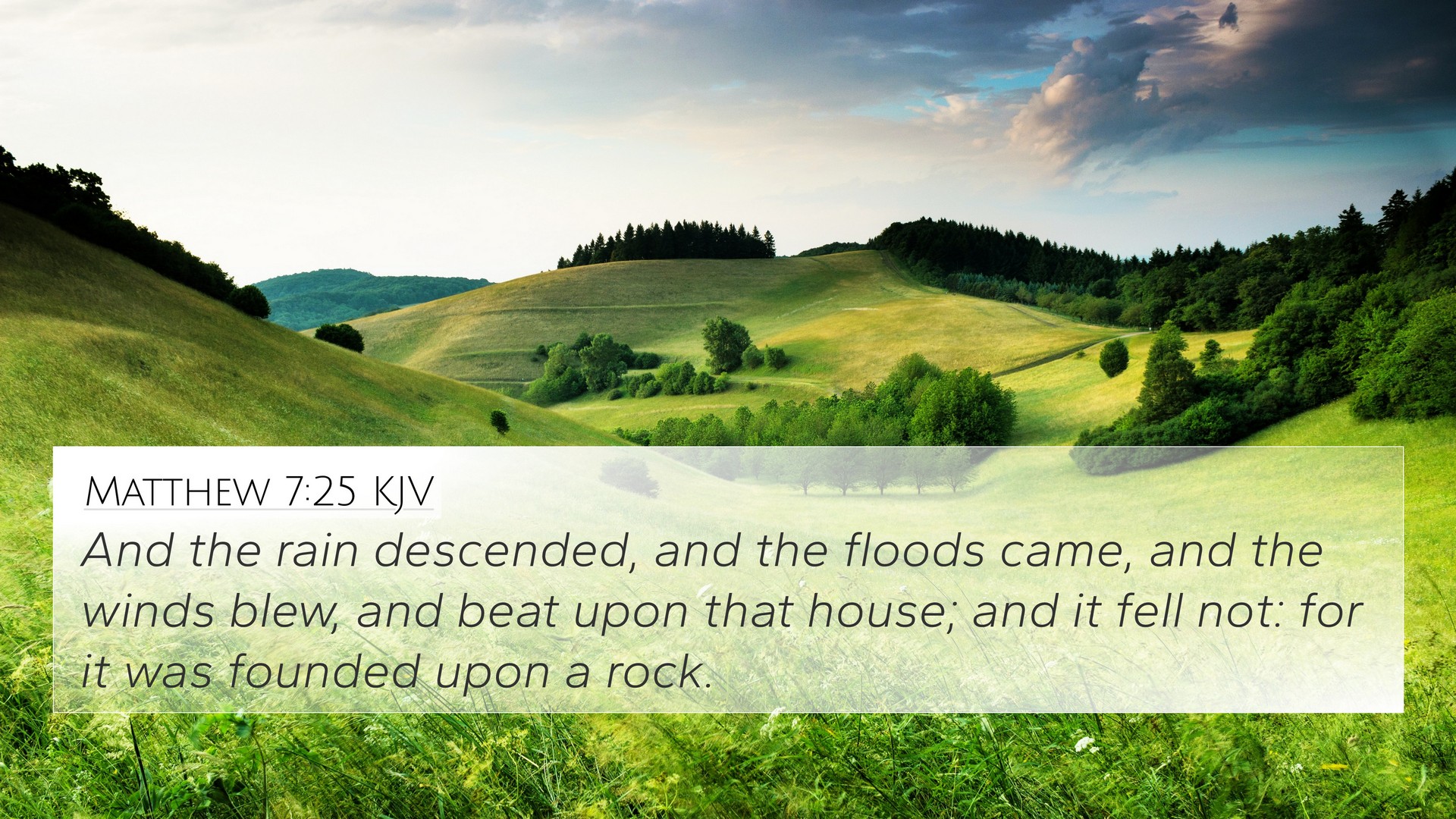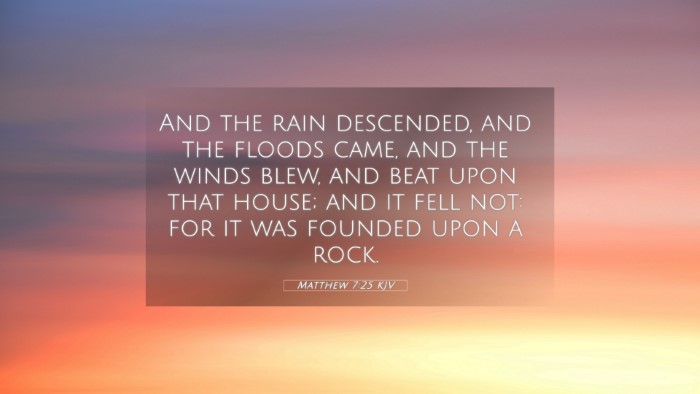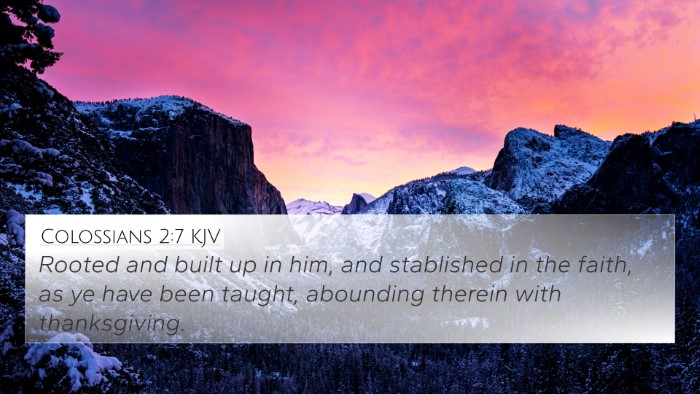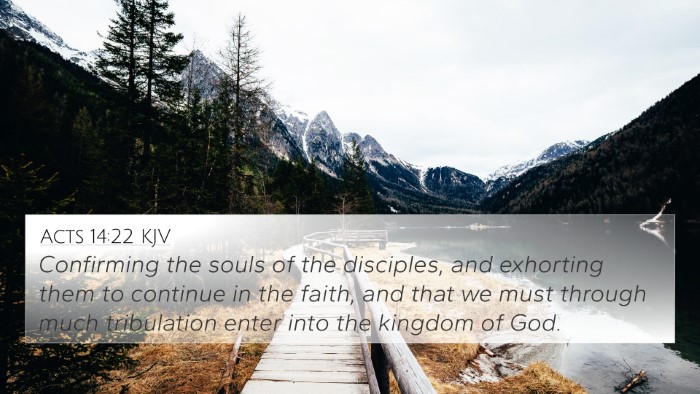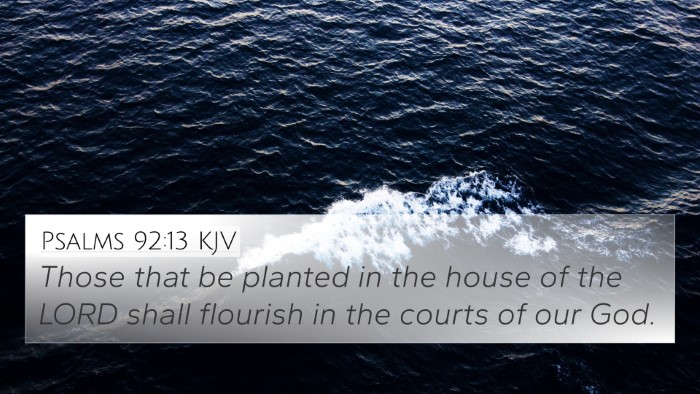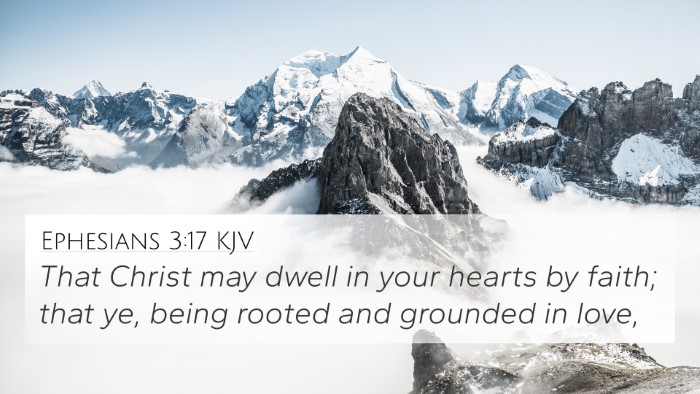Understanding Matthew 7:25
Matthew 7:25 states, "And the rain descended, and the floods came, and the winds blew and beat upon that house; and it fell not: for it was founded upon a rock." This verse forms part of Jesus’ conclusion to the Sermon on the Mount and emphasizes the importance of a solid foundation in one’s spiritual life.
Summary of Matthew 7:25
This verse illustrates the durability of faith built on the teachings of Jesus, contrasting it with the outcomes of those who do not heed His words. The imagery of storms symbolizes trials and tribulations that affect all believers, but it is faith founded on Christ that withstands these challenges.
Commentary Insights
Matthew Henry's Commentary
Matthew Henry explains that the "house" represents the soul or life of individuals. The foundation, being "upon a rock," signifies the deep and robust understanding of God's word. Henry emphasizes that when trials come, as they inevitably will, those who have built their lives on the solid foundation of Christ will remain steadfast and unyielded.
Albert Barnes' Notes
Albert Barnes notes that this verse reveals two kinds of builders—one wise and the other foolish. He stresses the importance of hearing and acting upon Jesus' teachings, suggesting that mere listening is insufficient without application. Barnes points out that enduring faith is not free from adversity but is defined by resilience amidst hardship.
Adam Clarke's Commentary
Adam Clarke underscores that the "rain" and "floods" symbolize divine judgment, and that the wise builder is the one who constructs their life on the principles of Christ’s teachings. Clarke suggests a call to action for believers to build a life that is not only attentive to Jesus’ words but also actively applies them, leading to spiritual stability in a tumultuous world.
Cross-References for Matthew 7:25
- Luke 6:48-49: Similar parable of building a house on a rock.
- 1 Corinthians 3:11: For other foundation can no man lay than that is laid, which is Jesus Christ.
- Ephesians 2:20: Built upon the foundation of the apostles and prophets, Jesus Christ himself being the chief corner stone.
- Psalm 125:1: They that trust in the Lord shall be as Mount Zion, which cannot be removed, but abideth forever.
- Romans 8:37: Nay, in all these things we are more than conquerors through him that loved us.
- Philippians 4:13: I can do all things through Christ which strengtheneth me.
- Hebrews 10:39: But we are not of them who draw back unto perdition; but of them that believe to the saving of the soul.
Thematic Connections between Bible Verses
In examining the overarching themes in Matthew 7:25, we find several connections with other key scriptures that underscore the importance of a steadfast foundation:
- Faith: Hebrews 11:1 discusses faith as the assurance of things hoped for, connecting with the idea of trusting in Jesus.
- Resilience: 2 Timothy 2:3 advises faithfulness in suffering, mirroring the strength found in Christ during trials.
- Obedience: John 14:15 highlights the necessity of loving Christ through obeying His commands, further supporting the theme of action.
- Preparation: 1 Peter 5:10 speaks of being made perfect after suffering, aligning with the endurance from Matthew 7:25.
How to Use Bible Cross-References
Utilizing cross-references in Bible study can deepen understanding. Here are tools and methods to consider:
- Bible Concordance: Helps locate verses related to specific words or themes.
- Bible Cross-Reference Guide: Provides systematic connections between verses.
- Bible Study Methods: Techniques like thematic studies or verse mapping can enhance interpretation.
- Bible Reference Resources: Various study Bibles offer integrated cross-references for easier navigation.
Conclusion
Matthew 7:25 not only emphasizes the importance of a strong spiritual foundation but also serves as an invitation to apply Jesus' teachings actively. By engaging with cross-references, believers can draw connections that enrich their understanding, promote resilience, and encourage growth in faith. The thematic ties between this verse and others provide a comprehensive framework for interpreting scriptural truths, ultimately leading to a fortified relationship with God.
